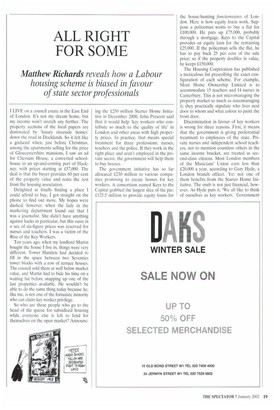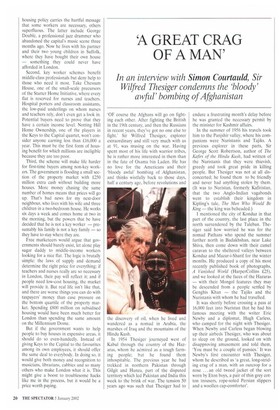ALL RIGHT FOR SOME
Matthew Richards reveals how a Labour
housing scheme is biased in favour of state sector professionals
I LIVE on a council estate in the East End of London. It's not my dream home, but my income won't stretch any further. The property sections of the local papers are dominated by 'luxury riverside homes' down the road in Docklands. So it felt like a godsend when, just before Christmas, among the apartments selling for the price of Gloucestershire mansions, I saw an ad for Chessum House, a converted schoolhouse in an up-and-coming part of Hackney, with prices starting at £57,000. The deal is that the buyer provides 60 per cent of the property value and rents the rest from the housing association.
Delighted at finally finding a place I could afford to buy, I got straight on the phone to find out more. My hopes were dashed. however, when the lady in the marketing department found out that I was a journalist. She didn't have anything against hacks in particular, but this oasis in a sea of six-figure prices was reserved for nurses and teachers. I was a victim of the Rise of the Key Workers.
Ten years ago, when my landlord Martin bought the house I live in, things were very different. Tower Hamlets had decided to fill in the space between two Seventies tower blocks with a row of terrace houses. The council sold them at well below market value, and Martin had to bide his time on a waiting list before snapping up one of the last properties available. He wouldn't be able to do the same thing today because he, like me, is not one of the fortunate minority who can claim key worker privilege.
So who are these people who go to the head of the queue for subsidised housing while everyone else is left to fend for themselves on the open market? Announc
ing the £250 million Starter Home Initiative in December 2000, John Prescott said that it would help 'key workers who contribute so much to the quality of life' in London and other areas with high property prices. In practice, that means special treatment for three professions: nurses, teachers and the police. If they work in the right place and aren't employed in the private sector, the government will help them to buy houses.
The government initiative has so far allocated £230 million to various companies promising to create homes for key workers. A consortium named Keys to the Capital grabbed the largest slice of the pie: £125.5 million to provide equity loans for
the house-hunting fonctiorznaires of London. Here is how equity loans work. Suppose a policeman wants to buy a flat for £100,000. He puts up £75,000, probably through a mortgage. Keys to the Capital provides an equity loan for the remaining £25,000. If the policeman sells the flat, he has to pay back 25 per cent of the sale price; so if the property doubles in value, he keeps £150,000.
The Housing Corporation has published a meticulous list prescribing the exact configuration of each scheme. For example, Moat Home Ownership Limited is to accommodate 15 teachers and 14 nurses in Canterbury. This is not micromanaging the property market so much as nanomanaging it; they practically stipulate who lives next door to whom and what colour to paint the front door.
Discrimination in favour of key workers is wrong for three reasons. First, it means that the government is giving preferential treatment to employees of the state. Private nurses and independent school teachers, not to mention countless others in the same income bracket, are treated as second-class citizens. Most London members of the Musicians' Union earn less than £20,000 a year, according to Gary Hyde, a London branch officer. Yet not one of them benefits from the Starter Home Initiative. The snub is not just financial, however. As Hyde puts it, 'We all like to think of ourselves as key workers.' Government housing policy carries the hurtful message that some workers are necessary, others superfluous. The latter include George Double, a professional jazz drummer who abandoned the capital's music scene three months ago. Now he lives with his partner and their two young children in Suffolk, where they have bought their own house — something they could never have afforded in London.
Second, key worker schemes benefit middle-class professionals but deny help to those who need it most. Take Chessum House, one of the small-scale precursors of the Starter Home Initiative, where every flat is reserved for nurses and teachers. Hospital porters and classroom assistants, the low-paid underlings on whom nurses and teachers rely, don't even get a look in. Potential buyers need to prove that they have a certain income level. Notting Hill Home Ownership, one of the players in the Keys to the Capital quartet, won't consider anyone earning less than £16,000 a year. This must be the first form of housing benefit for which millions are ineligible because they are too poor.
Third, the scheme will make life harder for first-time buyers among non-key workers. The government is flooding a small section of the property market with £250 million extra cash without building more houses. More money chasing the same number of homes means that prices will go up. That's bad news for my next-door neighbour, who lives with his wife and three children in a two-bedroom house. He works six days a week and comes home at two in the morning, but the powers that be have decided that he is not a key worker — presumably his family is not a key family — so they have to stay where they are.
Free marketeers would argue that governments should barely exist, let alone play sugar daddy to middle-income workers looking for a nice flat. The logic is brutally simple: the laws of supply and demand determine the right price for everything; if teachers and nurses really are so necessary in London, their pay will reflect it; and if people need low-cost housing, the market will provide it. But real life isn't like that, and there are worse things you can do with taxpayers' money than ease pressure on the bottom quartile of the property market. Spending £800 million on subsidised housing would have been much better for London than spending the same amount on the Millennium Dome.
But if the government wants to help people to buy houses in expensive areas, it should do so even-handedly. Instead of giving Keys to the Capital to the favourites among its own employees, it should offer the same deal to everybody. In doing so, it would give both money and recognition to musicians, librarians, cabbies and so many others who make London what it is. This might give a boost to troublesome hacks like me in the process, but it would be a price worth paying.























































 Previous page
Previous page